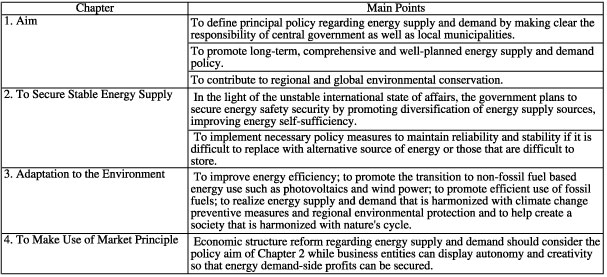|
Energy Policy Basic Law and Energy Policy Plan
Japan's first Energy Policy Basic Plan ("Basic Plan") was decided upon on October 7 by the Cabinet. This plan is devised in accordance with the Energy Policy Basic Law ("Basic Law"), which was promulgated and came into force in June last year.
The Energy Policy Basic law
The purpose of the Basic Law is to show the future direction of national energy policy. In 2001, the Energy Policy Subcommittee of the Liberal Democratic Party (LDP) introduced legislation to the Diet. In June 2002, the bill was passed and put into force. In the past, the Atomic Energy Basic Law and the Environmental Basic Law were enacted in Japan, but no law, covering energy policy has existed so far.
Embedded in this law are the following three principles regarding energy supply and demand measures: "security of stable supply," "environmental compatibility," and "application of free market principles." The obligations of the state, public bodies and private businesses are laid down to promote the principles in an organized and planned way. Table 1 shows a summary of the Basic Law.
Table 1. Outline of Energy Policy Basic Law

*Other chapters include: 5. Government's Responsibility; 6. Municipality's Responsibility; 7. Business Entities' Responsibility; 8. National Citizens' Efforts; 9. Mutual Efforts; 10. Legal Measures; 11. Report to the Diet; 12. Energy Basic Plan; 13. Promotion of International Cooperation; 14. To disseminate Information about energy.
However, as we have already pointed out in the previous issue (see Sep/Oct 2001, No. 85) a variety of problems arose from the process of enacting this law. Even though the LDP did not make its intentions clear, it is apparent that the party intends to make nuclear energy the pillar of national energy policy in spite of strong anti-nuclear movements. Mr. Tokio Kano (LDP), who proposed this legislation explained at a Diet session, "In my view, I believe that only nuclear energy conforms to all three basic principles."
Furthermore, it should be pointed out that "application of free market principles" is placed only at the third place. This goes against the world-wide trend of the liberalization of the energy sector. However, in spite of lobbying activity from citizens' groups and a signature campaign, the proposed bill was approved.
About the Energy Policy Basic Plan
The Basic Plan envisions the basis and direction of future energy policies in a qualitative manner with regard to the energy supply/demand for the next 10 years, based on the introduction of the Basic Law. The contents of the Basic Plan have been examined by the Planning Section held in the Ministry of Economy, Trade and Industry (METI) since this April. However, just like the other former examination panel, it is nothing more than a body to help the energy producers protect their own profits. The basic policies are almost entirely laid out by the government. The contents of the policies are only slightly adjusted in accordance with the comments from the committee members. As of the end of September, the proposed Basic plan has been submitted, but still many problems remain.
Regarding nuclear power the plan clearly states, "under the prerequisite of assuring safety, nuclear power should be placed as the primary source of electric power and should be promoted further." The proposed plan even extended to the public school's educational policy. For example, there is one provision which "encourages activities to help public understand the value of nuclear energy" where a strengthening of an advertisement campaign and the acquisition of knowledge in favor of nuclear energy at school would also be encouraged. Should nuclear energy be boldly advocated in public schools? According to the proposed plan, the "pluthermal" plan will be promoted as a preposition of the nuclear fuel cycle.
Furthermore, in another clause of "the harmonization of retail electricity liberalization and nuclear power as well as the promotion of the nuclear fuel cycle" proposes the necessity to create an appropriate environment for the development of nuclear energy in a liberalized electricity structure. For example, when power demand is low, priority should be given to nuclear power. This is based on the "Rule of Power Supply Priority Order." Other measures include enforcing the Law on the Regional Preparedness Around Power Generation Facilities" to provide more support to nuclear power generation. Those measures would not lead to the "right" electric liberalization.
If nuclear power is protected in such a way, energy policy will become inflexible and energy consumption will be stimulated while degrading the environment.
In early October, the report was submitted to the Cabinet and after the cabinet decision, it will, then, be referred to the Diet. Furthermore, there will be a release of an "Energy White Paper" based on this plan. The Basic Law will be tied up with the "long-term energy demand and supply outlook," which serves as the actual energy supply and demand target.
Originally, the Basic Law should outline Japan's principal energy policy, including the perspectives of Japan as a member of the international community. However, the proposed Basic Plan is nothing but a plan that is the resultant of different energy providers adjusting their interests and protecting their profits.
Among the three principles, only "energy security" has been the focus of attention. Japan, with its low energy self-sufficiency rate, imports resources from foreign countries by using the power of money and consumes a large amount of energy (the way in which it is used has many wasteful elements). The stance behind the Basic Plan--which emphasizes the current status quo--might be embarrassing for other countries. Japan should shift to a low energy consuming society.
(Tadahiro Katsuta, CNIC)
|

